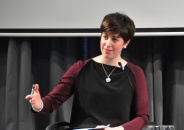Cultural Diplomacy & Media
By Marta Cooper (Editorial Assistant, Index on Censorship)

I think absolutely, in terms of building bridges across the gulfs that divide people linguistically, and from the media point of view, helping correspondents and journalists understand the countries they are reporting from and the Western audience they are serving. And I think in the case of Syria particularly, citizen media has been shown to be a really indispensable tool, particularly because Western journalists face so much difficultly entering the country. Of course there have been difficulties in verifying information, and that becomes far harder to do when we can’t necessarily have the on-the-ground reporters doing their job, but I think it does go somewhere into turning up the volume and helping a Western audience get a better picture of what’s going on.
…
I think micro-blogging, combined with education and governments creating more opportunities for young people, engaging better with the communities they serve, and the police also engaging better with communities, can help empower citizens to use new media to engage more with their politicians. It also helps for politicians themselves to engage with the communities they’re serving through on-line media, for instance, through hosting online web chats or using twitter to update their communities with what’s going on. From the point of view of transparency, it does go some way to helping the situation.
- The Berlin Freedom of Expression Forum; Berlin, Germany, February 28th- March 2nd, 2012




























































